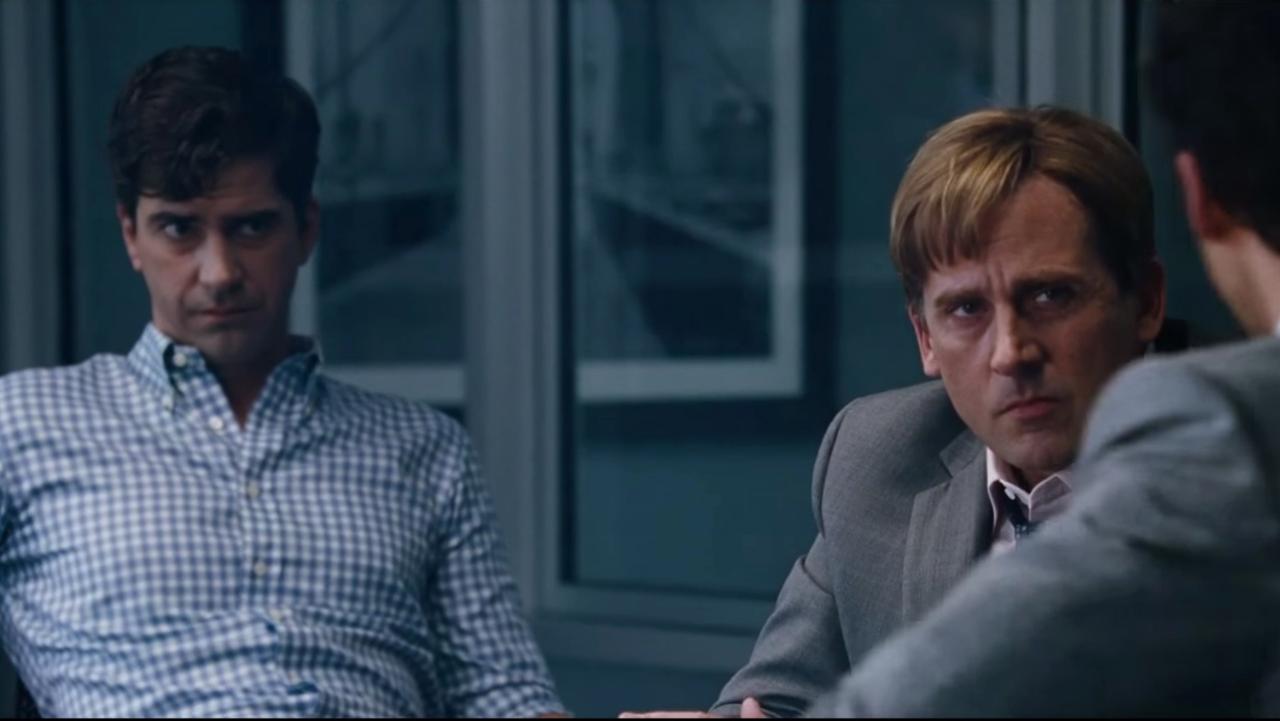Full disclosure: The Big Short by Michael Lewis is one of the best books I’ve read since I left school. It is also one of the most important books written this past decade. Retelling the story of the 2008 financial crisis through the eyes of the people who saw it, the book made financial jargon palatable, and pissed you off about the reckless behavior of a corrupted system. To make the movie, the intellectual bar is so high that even the author laughed openly about its feasibility. Much like the book, the movie needed an outsider: the writer/director of Anchorman, Talladega Nights, and The Other Guys. Adam McKay pulls of the impossible: not only does he translate the Big Short’s complex financial system for everyone, he incisively stabs the system in the heart with a laser focused attack on the brazen cluelessness and misunderstanding of the banker’s systemic fraudulent practices. Once you see, you’ll be pissed off.
Yes, many of the big banks failed to see the collapse coming until it was too late. However, The Big Short focuses on the outsiders who looked and found the rotten subprime mortgages. Michael Burry (Christian Bale), the glass eyed Asperger’s investor, simply READ the mortgages and figured out the increased rates would cause mortgage defaults in 2 years. Mark Baum (Steve Carell), a jaded distruster of the system, meets with Jared Vennett (Ryan Gosling), an even more cynical investment banker, who points out how the Credit Raters have misrated the credit ratings of the mortgage backed securities and gets Baum to bite. Finally, Charlie Geller (John Magaro) and Jamie Shipley (Finn Wittrock) are two young investors who bet on worst case scenarios (like, say, the housing market collapsing) use former trader Ben Rickert (Brad Pitt) to help get them a seat at the big boy banking table to bet against, or “short,” the housing market.
Collateralized debt obligations. Synthetic CDOs. Subprime mortgages. Credit default swaps. I’m falling asleep from sheer apathy just writing that. McKay knows it too. So he presents all this stuff through digestible metaphors and other means. Subprime mortgages don’t sound so bad when Margot Robbie is explaining them to you in a bubble bath. Jenga. Black jack with onlookers. Blind credit rating agents. Anthony Bourdain. Gosling explaining things to the audience. McKay uses every tool he can think of at his disposal to explain the complexity to the audience. More than a few times, light bulbs popped in my head from McKay’s metaphors. Not only light bulbs, but the anger built with more understanding.
And McKay doesn’t let up as the story goes on. And like we all would find out, the story would go from bad to worse. These people we are rooting for are hoping for a collapse of the banking system, making you squirm a little. In addition, these “heroes” start to realize that the collapse is being propped up by lots of fraud so the system can continue. It was painful to watch Michael Burry and the other good traders be yelled at by people who think they know better, and Mark Baum and the cynical people find new levels of cynicism. McKay’s best maneuver is using the two young investors (Geller and Shipley) to see their success through the eyes of the people who suffer, the common man. Much like the people they despise, these profiteers lost sight of the consequences of their actions (Burry did create the credit default swaps) via their greed and hubris as well. It’s a lose-lose situation for everyone except the creators of the system, which McKay points out very clearly in his epilogue. Via the bailout, the system has been allowed to continue, with very little change.
McKay’s actors are all top notch. Gosling is dynamite as the audience entry into the world. He embodies a banker perfectly, snarky, beautifully dressed and coiffed, and hubris incarnate. Christian Bale is mostly acting by himself, but he nails the idiosyncrasies of Dr. Michael Burry, channeling the feeling of not belonging and panic when things go bad. Brat Pitt is in this movie for 5 minutes, but he gets the most gut wrenching lines in the film that nearly brought me to tears. The surprise of the bunch is Steve Carell, who owns the films jaded heart. Carell is a relatively unlikable character until you learn about the reasons for his feelings, after which you feel empathy and sadness. Carell brings more dimensions out of the guy than the book does: impressive on his part. The other actors acquit themselves admirably, particularly Jeremy Strong as an underling for Baum and the Finn Wittrock/John Magaro combo being the audience standin with their childlike naivete and enthusiasm.
Much like the crash, people who don’t think the Anchorman/Talladega Nights/Other Guys director could take on The Big Short need to look more closely. Talladega Nights has sharp insight on the American mindset; a main plot point in The Other Guys is a Madoff Ponzi scheme (seriously, watch the end credits); and Anchorman 2’s first half is one of the sharpest critiques of cable news anyone has done. Like any good comedian, Adam McKay keeps evolving and inserting criticism with his humor, keeping himself relevant and necessary. His evisceration of the banking system in The Big Short can hopefully become a jumping off point for all those angry people who want to find out just what the hell happened.

